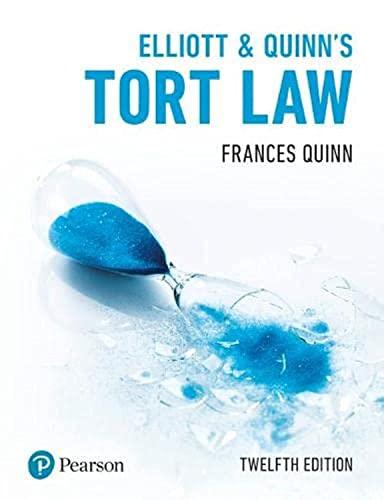Question
TORTS AND CONTRACTS This case has it all: Crocker v. Sundance Northwest Resorts Ltd., 1988 CanLII 45 (SCC), [1988] 1 SCR 1186 Remember also that
TORTS AND CONTRACTS
This case has it all:
Crocker v. Sundance Northwest Resorts Ltd., 1988 CanLII 45 (SCC), [1988] 1 SCR 1186
Remember also that it's possible for reasonable people to reasonably disagree on the outcome here: the trial judge found in favour of Crocker. The Ontario Court of Appeal, with one judge in dissent, found in favour of the resort.
At this level (the Supreme Court of Canada), Crocker is the Appellant/Plaintiff and Sundance Resorts is the Respondent/Defendant. Crocker "wins".
Remember also that a Waiver or Disclaimer is a form of contract and therefore requires, for our purposes here, that the elements of contract be satisfied
30. Sundance strongly urged that, even if it was negligent, its negligence did not cause the injury suffered by Crocker. The argument here is that tubing is inherently dangerous and demands no skill whatsoever. It is thus no more risky to participate in this sport when inebriated than it is to participate in it when sober. Sundance submits, therefore, that Crocker's injury cannot be attributed to his drunkenness. The failure of Sundance to take reasonable steps to prevent Crocker from competing because he was drunk did not cause his injury.
33. In the present appeal an attempt could be made to found a volenti defence either on (a) Crocker's voluntary participation in a sport that was obviously dangerous or (b) the fact that Crocker signed a waiver form two days before the competition. I will examine each of these bases in turn.
34. The first basis can be disposed of in short order. Crocker's participation in the tubing competition could be viewed as an assumption of the physical risks involved. Even this, however, is dubious because of the fact that his mind was clouded by alcohol at the time. It is wellnigh impossible to conclude, however, that he assumed the legal risk involved. Sliding down a hill in an oversized inner tube cannot be viewed as constituting per se a waiver of Crocker's legal rights against Sundance.
35. The argument that Crocker voluntarily assumed the legal risk of his conduct by signing a combined entry and waiver form is not particularly convincing either. The trial judge, having heard all the evidence, drew the following conclusion on the issue of the waiver at pp. 15859:
I find that no attempt was made to draw the release provision to Mr. Crocker's attention, that he did not read it, nor in fact, did he know of its existence. Therefore, Sundance had no reasonable grounds for believing that the release truly expressed Mr. Crocker's intention. In fact, in so far as he was signing anything other than an application form, his signing was not his act.
Given this finding of fact, it is difficult to conclude that Crocker voluntarily absolved the resort of legal liability for negligent conduct in permitting him, while intoxicated, to participate in its tubing competition. I would conclude, therefore, that Crocker did not, either by word or conduct, voluntarily assume the legal risk involved in competing. The volenti defence is inapplicable in the present case.
5.Waiver as Contractual Defence
At paragraph 30, Justice Wilson outlines Sundance's position that tubing is an inherently dangerous activity. Of course it is. As such, why can it not be said that Crocker voluntarily assumed the risk?
Step by Step Solution
There are 3 Steps involved in it
Step: 1

Get Instant Access to Expert-Tailored Solutions
See step-by-step solutions with expert insights and AI powered tools for academic success
Step: 2

Step: 3

Ace Your Homework with AI
Get the answers you need in no time with our AI-driven, step-by-step assistance
Get Started


